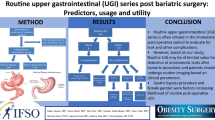Abstract
Many studies have showed that routine upper gastrointestinal contrast agent examinations (RCE) for testing the patency of the anastomosis after esophagectomy or the stapler line after sleeve gastrectomy cannot be recommended due to low sensitivity. However, the clinical value of RCE after gastrectomy for gastric cancer remains unclear. We have retrospectively analyzed the clinical course of 377 consecutive patients who underwent gastrectomy for gastric cancer in our institution between 2005 and 2015. To date, we have performed a RCE on the fifth postoperative day before removal of the nasogastric tube and return to oral intake. In total, we have observed 14 anastomotic leaks (AL) (4%) after oncologic gastrectomy. Four AL (28.6%) occurred before the scheduled RCE on the fifth postoperative day (POD) and 7 (50%) late AL after POD 5. Three patients (21.4%) without any clinical symptoms were diagnosed by the RCE. Sensitivity of RCE was 50%. A significant percentage of patients with AL was diagnosed by computed tomography (CT) of the abdomen (50%). The standard therapy for AL after gastrectomy was endoscopic stent placement (n = 11), including three cases of stenting after surgical revision. Based on our data, we cannot recommend a RCE after gastrectomy for gastric cancer. The majority of AL occurs before or after a RCE and the sensitivity of the examination is low. In case of clinical suspicion of AL, a CT scan (with oral contrast agent) should be performed. In unclear cases, endoscopy is the preferable method providing the option of direct treatment.




Similar content being viewed by others
References
Andreou, A., et al. Anastomotic leak predicts diminished long-term survival after resection for gastric and esophageal cancer. Surgery 160, 191–203 (2016).
Jones, C.M., Clarke, B., Heah, R. & Griffiths, E.A. Should routine assessment of anastomotic integrity be undertaken using radiological contrast swallow after oesophagectomy with intra-thoracic anastomosis? Best evidence topic (BET). Int J Surg 20, 158–162 (2015).
Mittermair, R., Sucher, R., Perathoner, A. & Wykypiel, H. Routine upper gastrointestinal swallow studies after laparoscopic sleeve gastrectomy are unnecessary. Am J Surg 207, 897–901 (2014).
Oestmann, J., Langenbruch, K., Meyer, H.J. & Gerlings, H. [Detection of insufficiencies of enteroenteral anastomoses following gastrectomies by studies with water soluble contrast media--time and study quality]. Rontgenblatter 38, 356–358 (1985).
Cunningham, D., et al. Perioperative chemotherapy versus surgery alone for resectable gastroesophageal cancer. N Engl J Med 355, 11–20 (2006).
Anter, A.H. & Abdel-Latif, R.M. The safety and efficacy of fluorouracil, leucovorin, oxaliplatin, and docetaxel (FLOT) combination in the front-line treatment for patients with advanced gastric or gastroesophageal adenocarcinoma: phase II trial. Med Oncol 30, 451 (2013).
Thuss-Patience, P.C., et al. Perioperative chemotherapy with docetaxel, cisplatin and capecitabine (DCX) in gastro-oesophageal adenocarcinoma: a phase II study of the Arbeitsgemeinschaft Internistische Onkologie (AIO){dagger}. Ann Oncol 23, 2827–2834 (2012).
Strasberg, S.M., Linehan, D.C. & Hawkins, W.G. The accordion severity grading system of surgical complications. Ann Surg 250, 177–186 (2009).
Washington, K. 7th edition of the AJCC cancer staging manual: stomach. Ann Surg Oncol 17, 3077–3079 (2010).
Bruce, J., Krukowski, Z.H., Al-Khairy, G., Russell, E.M. & Park, K.G. Systematic review of the definition and measurement of anastomotic leak after gastrointestinal surgery. Br J Surg 88, 1157–1168 (2001).
Tirnaksiz, M.B., Deschamps, C., Allen, M.S., Johnson, D.C. & Pairolero, P.C. Effectiveness of screening aqueous contrast swallow in detecting clinically significant anastomotic leaks after esophagectomy. Eur Surg Res 37, 123–128 (2005).
Mortensen, K., et al. Consensus guidelines for enhanced recovery after gastrectomy: Enhanced Recovery After Surgery (ERAS(R)) Society recommendations. Br J Surg 101, 1209–1229 (2014).
Tonouchi, H., et al. Diagnostic sensitivity of contrast swallow for leakage after gastric resection. World J Surg 31, 128–131 (2007).
Abou Rached, A., Basile, M. & El Masri, H. Gastric leaks post sleeve gastrectomy: review of its prevention and management. World J Gastroenterol 20, 13904–13910 (2014).
Lamb, P.J., et al. Prospective study of routine contrast radiology after total gastrectomy. Br J Surg 91, 1015–1019 (2004).
Igor, J., et al. The role of upper gastrointestinal swallow study in patients undergoing proximal or total gastrectomy. Isr Med Assoc J 12, 560–562 (2010).
Hogan, B.A., Winter, D.C., Broe, D., Broe, P. & Lee, M.J. Prospective trial comparing contrast swallow, computed tomography and endoscopy to identify anastomotic leak following oesophagogastric surgery. Surg Endosc 22, 767–771 (2008).
Acknowledgements
Dr. Struecker is participant in the BIH-Charité Clinical Scientist Program funded by the Charité – Universitätsmedizin Berlin and the Berlin Institute of Health.
Authors’ Contribution
All the authors meet all of the following criteria: substantial contributions to the conception, design of the work, the acquisition, analysis, and interpretation of data for the work; drafting the work and revising it critically for important intellectual content; final approval of the version to be published; and agreement to be accountable for all aspects of the work in ensuring that questions related to the accuracy or integrity of any part of the work are appropriately investigated and resolved.
Author information
Authors and Affiliations
Corresponding author
Ethics declarations
The current study has been reviewed and approved by the local ethics board.
Conflict of Interest
The authors declare that they have no conflicts of interest.
Additional information
Andreas Andreou and Matthias Biebl contributed equally to this work.
Rights and permissions
About this article
Cite this article
Struecker, B., Chopra, S., Heilmann, AC. et al. Routine Radiologic Contrast Agent Examination After Gastrectomy for Gastric Cancer Is Not Useful. J Gastrointest Surg 21, 801–806 (2017). https://doi.org/10.1007/s11605-017-3384-3
Received:
Accepted:
Published:
Issue Date:
DOI: https://doi.org/10.1007/s11605-017-3384-3




